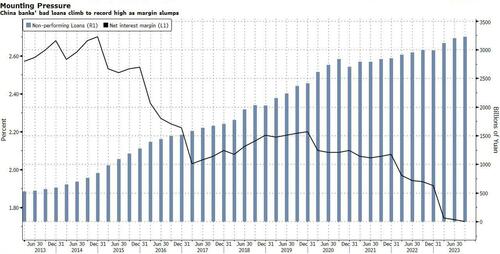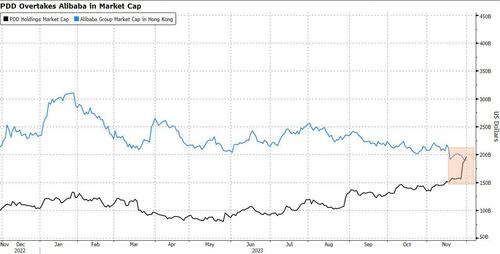
By Charlie Zhu and Helen Sun, Bloomberg markets live reporter and strategists
Three things we learned last week:
1. A protracted slump in China’s property market is hampering the broader economy’s recovery. Official data showed manufacturing activities contracted in November, while the services sector also lost momentum. A surprise pickup in a private manufacturing gauge was met with skepticism.
The latest data show there’s no end in sight for the crisis, with the decline in China’s home sales worsening. Homebuyer sentiment remained weak amid uncertain employment and income prospects, according to Fitch Ratings. Concerns over developers’ home delivery weighed on the market as more firms faced liquidity issues, analysts led by Karl Shen wrote in a report.
Neither infrastructure construction nor high-end manufacturing can fill the missing demand from a lack of home purchases, Wu Ge, chief economist at Changjiang Securities Co., wrote in a note. Wu previously worked at the central bank’s monetary policy department.
What’s worse, policy push to have banks offer a lifeline to developers is adding more pain to the financial sector. Lenders, which have already been suffering from soaring bad loans and record low net interest margins, face the prospect of big losses and job cuts.
2. China was left out in the everything rally that lifted global assets in November, underscoring the depth of pessimism. The CSI 300 benchmark closed near its weakest level of the year on Friday, even after a report that a state entity has purchased ETFs lifted stocks off their session lows.
Efforts at one of China’s largest investment banks to silence bearish commentary deepened investor worries about a lack of access to transparent data and research. A rally in equities traded on the Beijing Stock Exchange, which has been an outlier in the sluggish market, also lost steam.
Still, some investors are spotting opportunities. Fidelity International is timing a re-entrance into the market as Beijing prioritizes growth, while Franklin Templeton sees valuations as too attractive to ignore.
3. Amid all the gloom, the emergence of a new technology giant suggests the country is still a dynamic market. Shares of PDD Holdings Inc., an eight-year-old e-commerce platform, surged after reporting a near doubling in revenue. Its market cap outstripped Alibaba Group Holding Ltd. last week in a landmark shift for the country’s tech industry.
More of those valuable startups originating from China may become available for public investment. Fast-fashion retailer Shein is said to have filed confidentially with US regulators for an initial public offering that could take place next year.
By Charlie Zhu and Helen Sun, Bloomberg markets live reporter and strategists
Three things we learned last week:
1. A protracted slump in China’s property market is hampering the broader economy’s recovery. Official data showed manufacturing activities contracted in November, while the services sector also lost momentum. A surprise pickup in a private manufacturing gauge was met with skepticism.
The latest data show there’s no end in sight for the crisis, with the decline in China’s home sales worsening. Homebuyer sentiment remained weak amid uncertain employment and income prospects, according to Fitch Ratings. Concerns over developers’ home delivery weighed on the market as more firms faced liquidity issues, analysts led by Karl Shen wrote in a report.
Neither infrastructure construction nor high-end manufacturing can fill the missing demand from a lack of home purchases, Wu Ge, chief economist at Changjiang Securities Co., wrote in a note. Wu previously worked at the central bank’s monetary policy department.
What’s worse, policy push to have banks offer a lifeline to developers is adding more pain to the financial sector. Lenders, which have already been suffering from soaring bad loans and record low net interest margins, face the prospect of big losses and job cuts.
2. China was left out in the everything rally that lifted global assets in November, underscoring the depth of pessimism. The CSI 300 benchmark closed near its weakest level of the year on Friday, even after a report that a state entity has purchased ETFs lifted stocks off their session lows.
Efforts at one of China’s largest investment banks to silence bearish commentary deepened investor worries about a lack of access to transparent data and research. A rally in equities traded on the Beijing Stock Exchange, which has been an outlier in the sluggish market, also lost steam.
Still, some investors are spotting opportunities. Fidelity International is timing a re-entrance into the market as Beijing prioritizes growth, while Franklin Templeton sees valuations as too attractive to ignore.
3. Amid all the gloom, the emergence of a new technology giant suggests the country is still a dynamic market. Shares of PDD Holdings Inc., an eight-year-old e-commerce platform, surged after reporting a near doubling in revenue. Its market cap outstripped Alibaba Group Holding Ltd. last week in a landmark shift for the country’s tech industry.
More of those valuable startups originating from China may become available for public investment. Fast-fashion retailer Shein is said to have filed confidentially with US regulators for an initial public offering that could take place next year.
Loading…





